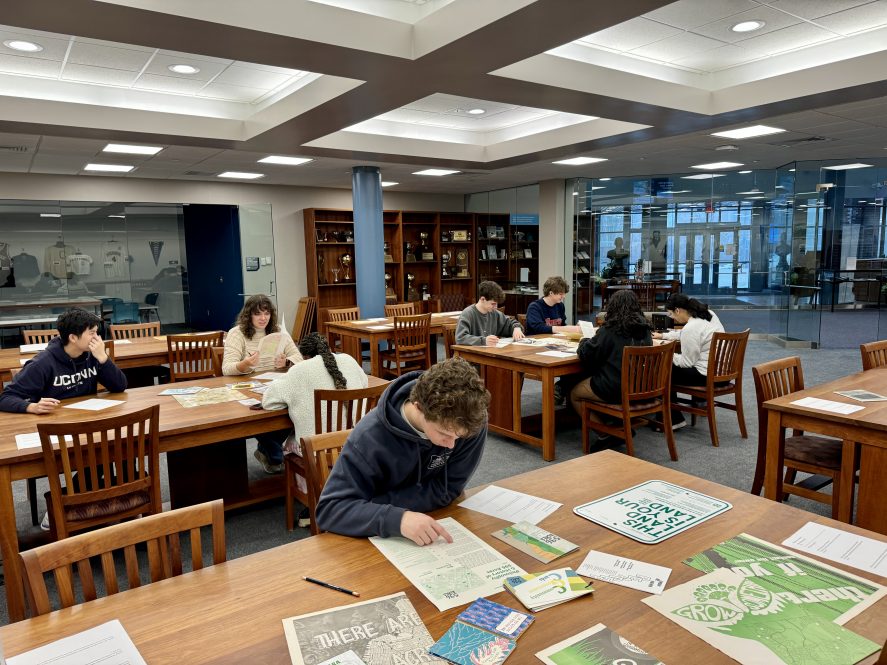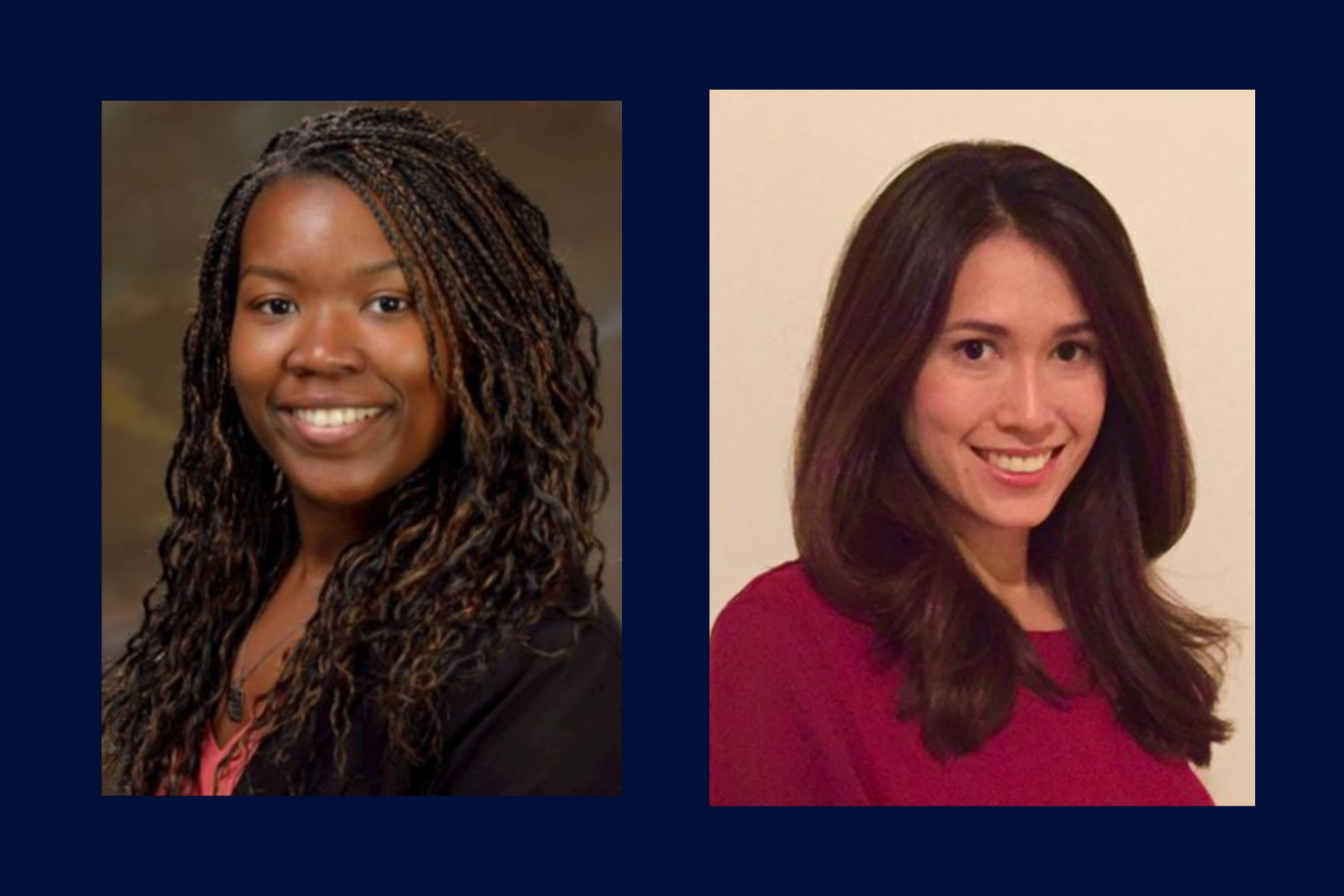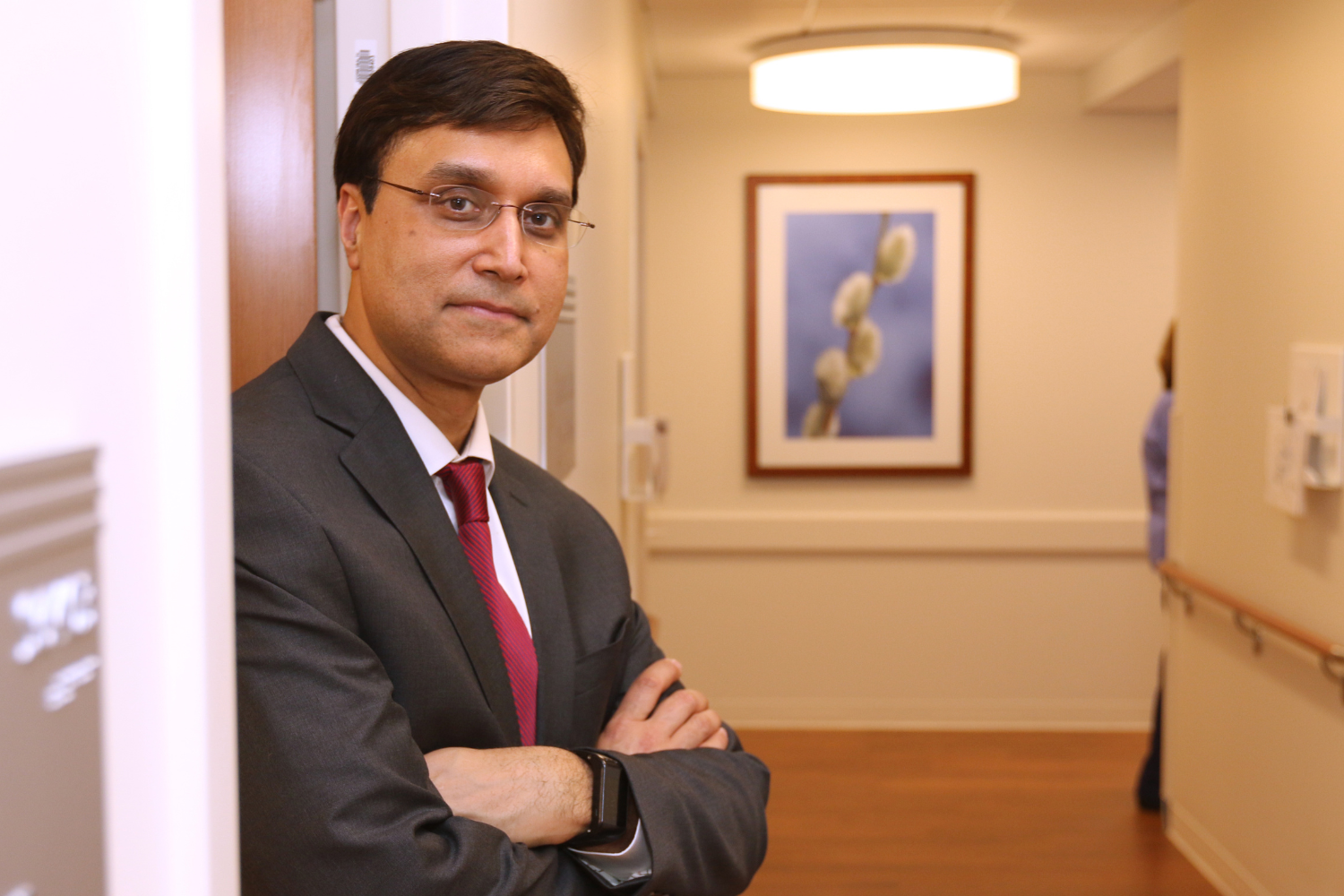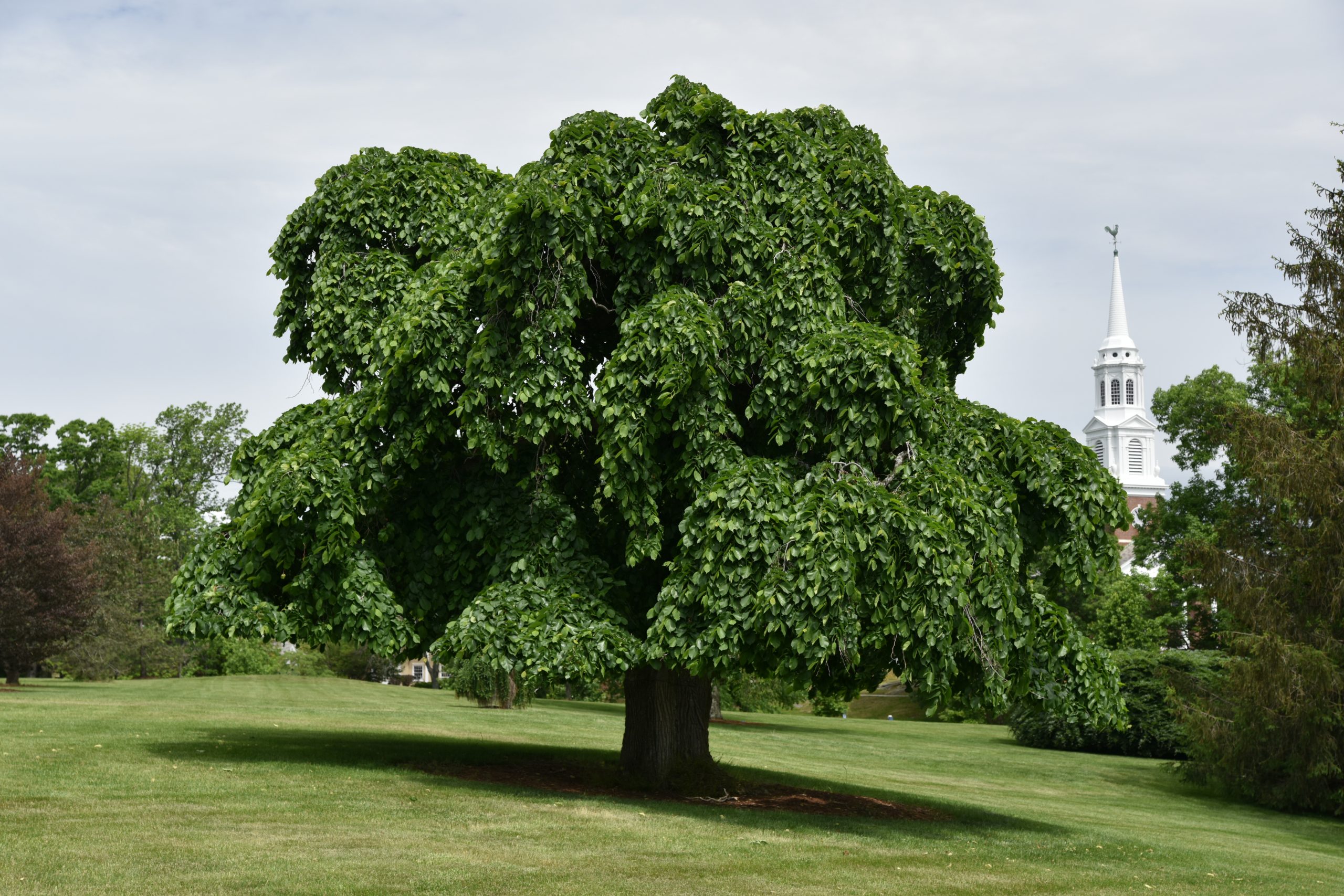Mia Rice ’25 (CAHNR) is studying environmental science at UConn. Growing up, she worked on farms and she hopes to work in sustainable farming after she graduates.
“I really like food,” she explains. “I don’t know how else to say that. I like food, I like good food, I like cooking, and it’s kind of crazy talking to some people, especially people my age – they just have no idea where their food comes from and that there might not be the same food in the near future.”
Her major incorporates a lot of issues surrounding climate change and sustainability, but one thing she says she hasn’t thought a lot about as an environmental science major is the interplay between business and sustainability.
Naiiya Patel ’25 (BUS), who’s majoring in accounting at UConn, has had almost the opposite experience.
While sustainability is something she deeply cares about and engages with on her personal time, it’s not a part of her formal studies in the School of Business.
“I’d really started to get involved in sustainability on campus and those types of clubs and initiatives,” she says. “But I hadn’t been involved in sustainability from my major or from my classes.”
One thing they did have in common was that neither Patel nor Rice had any affiliation with the Peter J. Werth Institute for Entrepreneurship and Innovation before they each saw postings about the pilot offering of a two-semester experiential learning course focused on transforming student passions for sustainability and climate change into action – and they both applied.
“That it was open to all majors, open to everybody, all you had to do was be passionate about sustainability – I felt like it was really easy for me to get involved,” Patel says.
Laying the Foundation
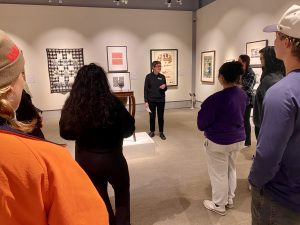
The Werth Institute launched the course – called ClimateWerx – in the fall 2023 semester with a pilot cohort of 15 students representing 11 different majors from five schools and colleges at UConn.
The program was structured similarly to a separate pilot, HealthWerx, that the institute offered over the spring and summer of 2023 that focused on community health.
“When we saw that HealthWerx was going really well, we were approached by the University to run a similar pilot around climate – taking activist-oriented students passionate in the space and supporting them in identifying actionable pathways forward, helping them build the toolkits they need to effectively execute upon their ideas for a more sustainable future, working past the multitude of difficult emotions that often come with engaging in the climate space,” explains Zoey England ’22 (CLAS), the chief of staff at the Werth Institute who serves as the instructor for both HealthWerx and ClimateWerx.
Like its predecessor, the ClimateWerx pilot started with a first semester two-credit discussion course that progressed into a second semester experiential learning opportunity. The only requirement for the course was that students have a passion for sustainability and climate change – all undergraduate majors and levels of study were invited to apply.
That first semester, England says, was all about getting the cohort onto a similar foundation and building core competencies around climate change and sustainability.
“When you have that much diversity in both educational pathways and lived experiences, you can really utilize it in the classroom,” she says.
First assessing the existing climate and sustainability landscape, the students then explored the human, economic, environmental, and social pillars of sustainability within a changing environment. The class covered topics ranging from renewable energy to planetary health and population displacement, effects felt in the natural world, and environmental justice and community infrastructure.
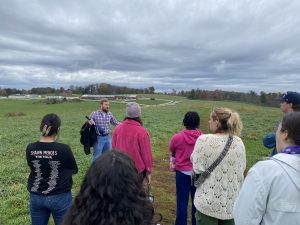
They went on guided walks through the UConn Forest and at Horsebarn Hill and participated in workshops at the Benton Museum of Art on campus. Guest speakers came to the class to present on related topics, and the cohort members were invited to participate in additional networking opportunities to help support them in building both peer and professional connections.
“I felt like we were getting a real education on climate change,” says Patel, “where you’re in the classroom, you’re talking about it with people, you’re talking about the social impacts, you’re learning about the physical impacts, the emotional – all of it.”
At the end of the first semester, the students were tasked with developing and presenting proposals for ideas related to sustainability and climate change.
Rice and Patel worked together with a third student – Colin Piteo ’24 (CLAS), a history and political science major – on a proposal focused on supporting UConn students who are struggling with eco-anxiety.
“When we were thinking of a specific project that you could build up, I immediately went to eco-anxiety and how can you help undergraduate students with it?” says Patel. “We knew how difficult it would be to actually make something that would come to life. What we ended up going with was a support group for people with eco-anxiety, and the way we wanted to go through it was to do it through a club, because then you get that student-to-student connection.”
Internships, Research, and Ventures
For their second semester, the ClimateWerx cohort members transitioned to one of three experiential learning opportunities: pursuing research in a UConn lab, completing an internship with a Connecticut-based climate-oriented startup, or developing and launching their own idea or venture.
Of the initial 15 members of the cohort, 11 continued into the second semester – six chose to enter internships, two pursued research, and three started to build an idea or venture.
Patel and Piteo opted to continue developing the eco-anxiety club concept as their experiential learning opportunity.
“At the end of the semester, Colin and I were trying to figure out, are we going to do research? Are we going to do an internship?” says Patel. “And we were not finding an exact click of what we liked. Then, we asked Zoey, we could we just make this come to life? And she was like, of course you could.”
Their new club, which they formally created and launched this semester, is called the UConn Climate & Mind Network, and it’s dedicated to helping students through the climate crisis and providing an outlet for students to openly talk about the anxiety and stress they feel around global climate change.
They debuted their club at this spring’s Involvement Fair and plan to focus on three main events as the framework for their initial launch – a “Good Food and Climate News” event, where faculty and students will talk about positive climate action advancements being made at UConn and beyond; an eco-anxiety mental health check-up in collaboration with Student Health and Wellness; and an agritourism -style event in collaboration with Spring Valley Student Farm.
“For the three events, one is geared toward creating positivity and trying to combat the negativity in the climate change area – this was all based on some research I had found about solutions that people could have, and one of them is don’t doom scroll, look at the positives of what’s being done,” Patel explains. “One of them is about talking to others, getting reconnected to nature again. And then the other is seeking mental health help and support.”
For her experiential learning opportunity, Rice chose to step into a “side-character” role with the club, she says, and try out an internship.
Students opting for internships were paired with companies through the Werth Institute’s entrepreneurial partnerships, explains England.
“Some of the startups are being incubated within the Connecticut Innovations climate tech portfolio and others are also tied into Climate Haven – a recently launched incubation space and in-person coworking area in New Haven,” she says.
Rice was paired with Enko, a biotech startup based in Mystic that’s working to develop sustainable and targeted agricultural products for weed, disease, and insect control using DNA-encoded libraries, AI and machine learning, and structure-based design.
“I’ve actually been doing a variety of different things,” she says. “My first day, I was in the labs, and I just helped the lab techs do some work. I made insect food, and I incubated some insect eggs. For the past few weeks, I’ve been working in the greenhouses. I planted a bunch of germinated seeds and prepped pots.”
The ClimateWerx cohort also continues to meet as a class each Friday this semester. At their gatherings, they discuss learnings from the previous week as well as any stumbling blocks they may have experienced.
The group also engages in an activity each week to reinforce learning objectives and cultivate connections, oftentimes a site visit, guest speaker, or discussion. This semester, ClimateWerx is visiting the UConn Archives to learn about the legacy of eco-activism at the University, touring the Reclaimed Water Facility with UConn’s Facilities team, and engaging with the University’s NatureRx programming.
The group has coffee chat-style engagements with alumni and leadership of the companies they are placed at, and time is also devoted to assisting the students with professional development, including explaining ClimateWerx in interviews and on résumés.
“For students studying climate change, learning to communicate complex issues is paramount,” says England. “This involves breaking down scientific jargon into accessible language, utilizing compelling narratives to illustrate the human impacts of climate change, and leveraging multimedia tools to explain issues to cross-sector audiences.”
Skills for the Future
For Rice, ClimateWerx and her internship experience gave her an opportunity to see a side of sustainability she hadn’t previously thought about while also showing just how far her environmental studies degree might take her.
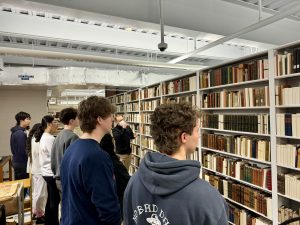
“Environmental science is so broad, and people ask me all the time, ‘Well, what do you do with that?’ And I typically don’t have a good answer,” she says. “This is kind of giving me the chance to realize what I can do. And it’s also a great opportunity to talk with other people that have been in the industry for a long time. I think that’s how it’s helping me the most – seeing what other people are doing and their connections and where everyone ends up.”
For Patel, ClimateWerx offered examples of how a passion for sustainability and a desire to make change didn’t mean that she needed to give up her major or change her entire educational direction in order to help make a difference.
“Through the events we had in the course, there was a lot of emphasis on how you don’t necessarily have to go in a particular career path to be able to make an impact,” she says. “A lot of the things that we were open to were initiatives that people started on their own, but at the same time, it wasn’t their main career. There were a lot of clubs and side ventures and things that they just did in their free time to help. So, it was really nice to be exposed to that.
“The idea that I might go into accounting now – it doesn’t mean that I can’t go into sustainability later in age or even do it while I’m an accountant.”
And that’s part of what experiential learning opportunities like ClimateWerx can offer UConn students, says England – a chance to learn how to trust their own skills while seeing how those skills could translate into new, developing, or unique spaces.
“In traditional classroom settings, students rarely have the opportunity to explore complex, problem-focused challenges like climate change,” says England. “Yes, they’re learning, but they’re not really developing that trust and confidence in themselves to be able to go, ‘OK, I have the skill sets to take my idea and build it out, present it to a group, and then implement it in whatever space or arena I might be in the future.’
“We’re helping students continue to develop those skills, supporting them along the way.”
For more information about entrepreneurial and educational opportunities available through the Werth Institute, visit werth.institute.uconn.edu.
